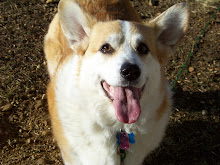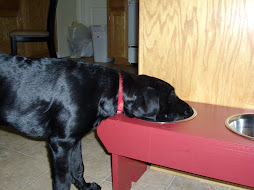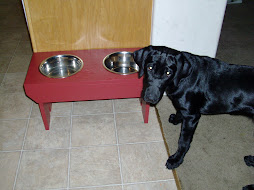 Well, I don't need a calendar to tell me that fall has arrived. I have my allergies to tell me that. I get so itchy and scratchy this time of year and it sure can make me one miserable pup! Being a "low ridder" pup makes it even extra hard on me since my belly brushes against a lot of the weeds and grasses.
Well, I don't need a calendar to tell me that fall has arrived. I have my allergies to tell me that. I get so itchy and scratchy this time of year and it sure can make me one miserable pup! Being a "low ridder" pup makes it even extra hard on me since my belly brushes against a lot of the weeds and grasses.Anyhow, I came across this great article from Doctors Foster and Smith and thought that it would be a good idea to share it with other pups who might be suffering from allergy problems too. So check out the article below and see if maybe all of your itching and scratching being caused by allergies.
*****************
Types of Allergies That Affect Pets
There are four types of allergies that can affect your pet. Allergies caused by things your pet inhales are termed airborne allergies. Common sources are pollens, molds, and dust mites. Allergies that result from flea-bites are referred to as flea allergies or flea-bite dermatitis. Certain allergies occur from items your pet ingests, and are typically called food allergies. Contact allergies are caused by something your pet comes in direct contact with, such as carpet fibers, plastics, and other things. Contact allergies (plastics, carpet fibers, detergents) are far less common than inhalant allergy and flea allergy dermatitis in pets.
Contact Dermatitis
Less common allergies include contact dermatitis, which include allergy to carpets, cleaners, or plastic. These allergies may cause:
* Red itchy bumps or blisters on sparsely-haired areas of the skin and those exposed to the allergen such as the belly, feet, or muzzle
* Intense scratching
* Hair loss (in chronic conditions)
Food Allergies
Food allergies account for about 10% of all allergies in dogs and cats. Food allergies may show up concurrently with allergies to pollen, dust, etc. Symptoms include:
* Itching, especially face, feet, trunk, limbs and anal area
* Ear problems, often yeast-related
* Skin infections that respond to antibiotics, but then recur as soon as the antibiotic therapy ceases
Occasionally, dogs with true food allergies may have increased bowel movements and soft stool. Food allergies should not be confused with food intolerances, which are not true allergies, and generally cause diarrhea and vomiting.
Watching your pet go through the misery of allergy symptoms can be miserable in itself. If you suspect your pet has allergies, visit your veterinarian. The type of allergy and severity of the symptoms will determine how your veterinarian decides to treat them.
*****************
Well, I am off to get a bath in oatmeal and tea leaf shampoo - I'll be barking to you later!












No comments:
Post a Comment